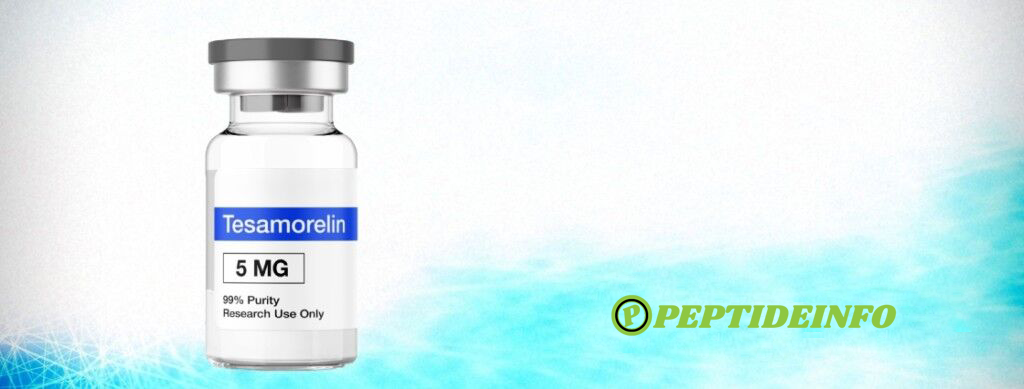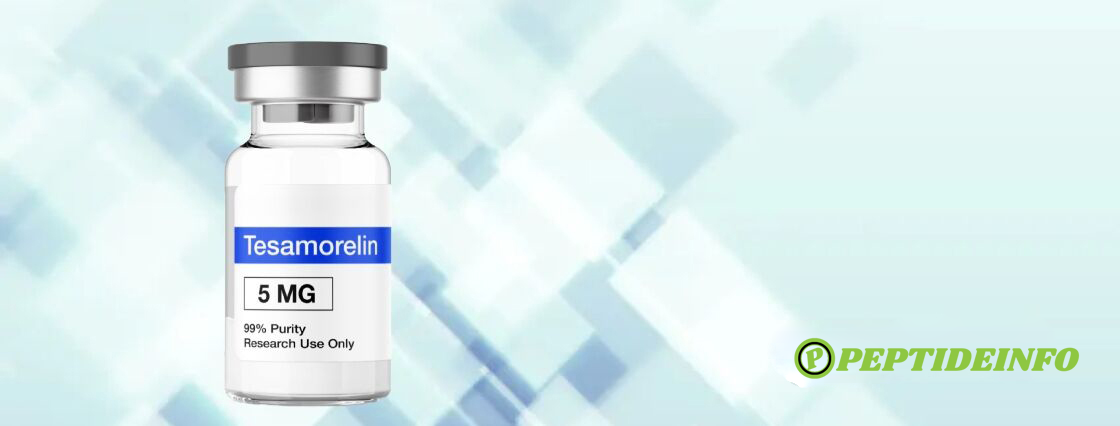Tesamorelin Dosage Chart | Quick Breakdown
| Research Objective | Dosage (Subcutaneously) | Study duration |
| Daily Dosage for Body Composition Improvement | 1-2mg/daily | 20-52 weeks |
What is Tesamorelin?
Tesamorelin peptide, also known by its trade name “Egrifta”, is a synthetic sequence of amino acids that mimics growth hormone-releasing hormone (GHRH) [1]. GHRH is one of the thousands of peptides in the body that help regulate bodily functions [2].
In addition to being a peptide for research purposes, tesamorelin is also approved by the United States Food and Drug Administration (FDA) as a prescription medication for lipodystrophy—a condition associated with the HIV virus that causes patients to accumulate fat around the midsection.
Tesamorelin Peptide Structure
Tesamorelin peptide has a chemical structure that is essentially the same as GHRH [3]. The primary function of GHRH is to stimulate the production and release of growth hormone, also known as GH or human growth hormone, HGH.
What is HGH?
HGH is a hormone that plays a critical role in multiple bodily processes including the growth of new tissue and repair of old tissue. HGH helps build muscle, repair, and rejuvenate the skin, synthesize bone material, and much more [4]. HGH is especially important not just to ensure optimum growth in children but also to otherwise healthy adults in need of muscle repair.
The problem is that HGH levels naturally decline with age [5]. To combat this, some scientists have studied the effects of exogenous HGH administration to test subjects. Results from these studies have demonstrated positive benefits of GH therapy [6] but have also highlighted significant side effects [7].
That’s where tesamorelin comes in. It’s a GHRH mimetic that, studies have shown, can stimulate HGH without causing the same side effects seen with HGH.
Tesamorelin and HGH
Tesamorelin is best thought of as an alternative to exogenous HGH; it stimulates the body to secrete its own HGH and is believed to have fewer adverse effects. In other words, tesamorelin is believed to have a better safety profile than HGH.
Let’s take a close look at some of tesamorelin’s purported benefits and uses.

Tesamorelin Benefits and Uses
So what benefits does tesamorelin offer?
In the U.S., tesamorelin is sold under the brand name “Egrifta” and is used to treat HIV-positive patients with lipodystrophy caused by long-term antiretroviral therapy (ART).
However, other research has highlighted other clinically significant effects of tesamorelin:
- Increasing HGH. Several studies have noted that tesamorelin increases HGH in test subjects [8, 9]. This may have an impact on the body’s ability to grow and repair tissue.
- Burning fat. A number of studies have found that tesamorelin can significantly reduce fat in the stomach, in muscles, and even in the liver [3, 10, 11].
- Increased muscle. In elderly test subjects, tesamorelin has been shown to increase strength, muscle density, and the size of muscles [12].
- Improving cognition. Research has shown that tesamorelin can actually help test subjects with mild cognitive impairment perform better on cognitive tests [13, 14, 15].
- Nerve tissue repair. There is some evidence that suggests tesamorelin could help repair damaged nerve tissue in animal models [16].
- Reducing the risk of cardiac disease. Preliminary research suggests that tesamorelin may reduce the risk of cardiovascular diseases [11, 17].
While these purported benefits sound encouraging, it must be stressed that tesamorelin’s sole use it to treat lipodystrophy. Research into tesamorelin’s other benefits is lacking and this may merit further investigation.
Is Tesamorelin Legal?
The above benefits may be of interest to researchers, but is tesamorelin legal?
The legal status of tesamorelin varies from country to country. Each country has its own rules. But, yes, it is legal to buy tesamorelin in most countries.
There are two main ways that tesamorelin can be legally purchased. Firstly, patients diagnosed with lipodystrophy may obtain tesamorelin via prescription. Secondly, tesamorelin can be purchased by researchers for use in experiments. As such, it is classified as a “reference material” and can be used for research purposes only.
Let’s take a look at tesamorelin’s side effects.
Tesamorelin Side Effects
Researchers interested in experimenting with tesamorelin should be aware that clinical studies have linked this peptide to many adverse events (AEs) [3, 11, 18, 19, 20, 21, 22, 23]. These AEs are listed below with their rate of incidence in test subjects:
- Injection site reactions, like pruritus, rash, pain, and swelling (3.1%)
- Arthralgia (2.4%)
- Pain in the extremities (1.1%)
- Myalgia (1.1%)
- Peripheral edema (1.1%)
- Paresthesia (0.9%)
- Hypoesthesia (0.7%)
- Rash (0.7%)
- Dyspepsia (0.3%)
- Muscle pain (0.3%)
- Pruritus (0.3%)
- Vomiting (0.3%)
- Muscle stiffness (0.3%)
- Carpal Tunnel Syndrome (0.2%)
- Joint swelling (0.2%)
- Night sweats (0.2%)
- Palpitations (0.2%)
Furthermore, clinical studies have linked tesamorelin to the following serious adverse events:
- Increased risk of glucose intolerance
- Increased risk of type 2 diabetes
- Disruption of hypothalamic-pituitary axis
- Neuropathies
- Lipoatrophy
- Diarrhea
- Fever
- Congestive heart failure
- Peripheral neuropathy
- Loss of mobility
To date, no long-term tesamorelin studies involving healthy (non-elderly, non-HIV-infected) test subjects have been completed, suggesting that further research is merited. Therefore, researchers should carefully screen test subjects for pre-existing conditions before experimenting with this peptide.
Tesamorelin Dosage Calculator and Guide
Researchers who wish to experiment with tesamorelin should note that its only approved therapeutic use is the treatment of lipodystrophy in HIV patients.
While there is strong research interest in the application of tesamorelin for other purposes, such as to improve body composition or athletic performance, there is currently no published research to indicate the dosage at which tesamorelin should be administered to these ends.
Peptide researchers may therefore consult the following data taken from relevant research findings when designing an experiment.
Tesamorelin for Lipodystrophy
When prescribed to treat lipodystrophy in HIV patients, the typical dose of tesamorelin is:
- One daily subcutaneous injection of tesamorelin
- 2mg of tesamorelin per dose
- Administered in the abdominal region
- Taken at night, at least 90 minutes after eating
According to data from Phase III clinical trials involving HIV-infected study volunteers with lipodystrophy, this treatment produces significant reductions in visceral adipose tissue (VAT) fat without affecting adipose tissue (SAT) fat (on limbs or subcutaneously) when administered for 26 weeks.
When treatment was continued to 52 weeks, triglyceride levels fell and insulin-like growth factor-I (IGF-1) levels increased in the subjects.
Tesamorelin for Body Composition Improvement
Tesamorelin has been tested regarding its impact on body composition and weight loss in individuals with abdominal obesity.
One trial involving 60 abdominally obese subjects with reduced GH secretion reported a significant reduction in abdominal fat after 12 months of tesamorelin at up to 2mg/once-daily [24].
Researchers interested in investigating tesamorelin for weight loss may also consider initiating the therapy with lower doses for the first 4 weeks of the trial to assess subject tolerance, before increasing the dose to up to 2mg/daily.
Based on the available research, here is a sample tesamorelin dosing protocol as a reference:
- Dose: Initiate at 1mg/daily to assess the test subjects’ tolerance. Then increase to up to 2mg/daily.
- Frequency: Administer tesamorelin as a subcutaneous injection once daily before bed.
- Study Duration: 20-52 weeks.
- Notes: Researchers are advised to administer the peptide at least 90 minutes after the last meal in the evening. Do not exceed 2mg/daily.
Tesamorelin Dose for Cognition
For cognition, studies have found success using the following dose of tesamorelin [14]:
- 1mg of tesamorelin
- One injection daily
- At night, 30 minutes before bed
- 5 days on, 2 days off
- Duration of 20 weeks
How to Administer a Dose of Tesamorelin
Clinical trials indicate that tesamorelin is injected subcutaneously, or under the skin. Researchers planning to administer tesamorelin to test subjects may follow these guidelines:
- Wash hands: Use soap and water to help prevent infection.
- Reconstitute the tesamorelin dosage. Inject bacteriostatic (sterile) water into the vial and then swirl (but don’t shake) it until everything is dissolved.
- Ensure no particles: Check for the presence of particles or discoloration. Discard the vial if any are noticed.
- Clean the injection area: Swab the area with rubbing alcohol.
- Inject under the skin: Administer the injection into the abdominal region, at least two inches away from the belly button of the test subject. Avoid areas with bruising, redness, or scar tissue.
- Rotate the location for each injection: This helps avoid issues with over-injection in one area.
Following these instructions will help reduce the incidence of side effects and infection in test subjects.
Other Notes on Tesamorelin Dosage
Here are some other notes about administering tesamorelin to test subjects that researchers may consider.
- Administer tesamorelin at night. HGH levels peak physiologically during nighttime. Administering tesamorelin to test subjects in the evening may enhance its effectiveness.
- Take tesamorelin at least 90 minutes after food. Food may interrupt how tesamorelin is absorbed. If nighttime dosing is not possible, an early morning dose may be suitable.
Having covered the main ways that tesamorelin may be dosed, we should mention where researchers can buy this peptide online.

Where to Buy Tesamorelin Online? | 2024 Edition
Many online vendors sell tesamorelin online, giving researchers plenty of choice on where to shop.
But a word of caution: not all vendors are legitimate. In fact, many vendors are not, and they may sell peptides that are underdosed or contain fillers.
To avoid this issue, our team has reviewed over a dozen of the top peptide vendors online.
At Peptideinfo.net, we trust the following vendor as a source of high-quality tesamorelin.
Research Peptide
Research Peptide is a US-based peptide source that currently lists tesamorelin 10mg for $79. Additionally, they offer the following benefits:
- The Best Quality Around: Research Peptide guarantees a super high-quality product—exceeding 99% purity. They get an independent laboratory to test their products and then post a certificate of that analysis right on their website for customers to easily review.
- Fast, Secure Shipping: Research Peptide is based in the United States, so domestic shipments typically arrive within 2-5 days. Best of all, this vendor waives shipping charges on US orders over $200.
- Great Discounts: Researchers can also get a steep discount. For example, signing up for the vendors email list grants a 10% off on the first purchase for research purposes.
Buy Tesamorelin from our top-rated vendor…
Research Peptide
For highly pure, independently lab-tested Tesamorelin, we recommend sourcing them from Research Peptide.
In addition, Research Peptide has earned a noteworthy reputation in the greater research peptide community, and they have a highly responsive and helpful customer service team.
Here are a few more reasons we recommend Research Peptide:
- Partnerships with Third-Party Labs: Research Peptide employs rigorous third-party testing for all of their products to ensure that each batch meets their strict quality control standards.
- Outstanding Reputation: Research Peptide is trustworthy and reputable, a fact that’s backed up by their high reviews on third-party review sites as well as a low rate of credit card chargebacks.
- Responsive Service: WIth daily service hours, Research Peptide is always readily available to promptly answer questions and address order concerns.
- BBB Accredited: With recognition from Dun and Bradstreet and accreditation by the Better Business Bureau, Research Peptide has demonstrated their business acumen.
Researchers can access tesamorelin and more through Research Peptide VIP club. Click below to sign up instantly:
Buy research peptides from Research Peptide today…
Bacteriostatic Water for Tesamorelin
Most researchers have probably experienced the limitations of lacking the correct supplies. Especially when correctly preparing and storing peptides, the right set of tools is indispensable.
Unfortunately, gathering all the required items, such as sterile vials, alcohol wipes, and bacteriostatic water, can be a burden that delays research.
We at Peptideinfo.net set out to find a solution to this problem, surveying the web to find one great supplier to meet all research needs.
Tesamorelin Dosage | Verdict
Researchers curious about the right tesamorelin dosage for their next experiment will note that this cutting-edge peptide is already being used with great success to treat lipodystrophy, a fat distribution disorder commonly afflicting HIV patients.
However, further research into tesamorelin’s purported benefits in healthy test subjects is warranted. The peptide is designed for subcutaneous administration and generally avoids the side effects typical for exogenous HGH therapy.
Qualified researchers wishing to begin their own experiments are advised to visit our preferred peptide vendor.


